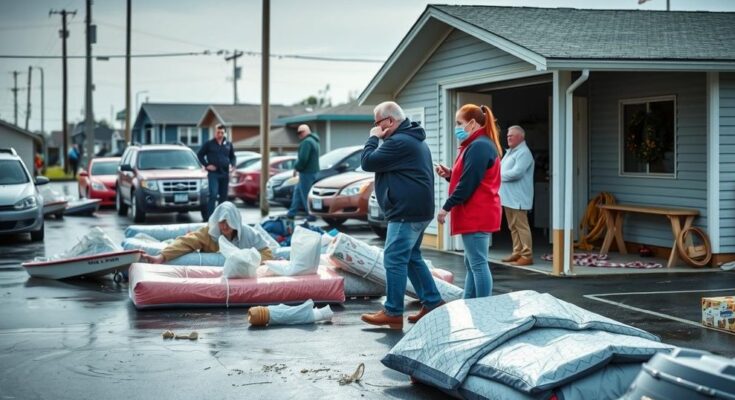Virginia Governor Glenn Youngkin proposed a $127 million Disaster Assistance Fund to aid recovery efforts for residents impacted by Hurricane Helene. The fund aims to cover costs not addressed by federal aid, with a focus on rebuilding infrastructure and supporting communities affected by the disaster. The proposal requires legislative approval from the Democrat-controlled General Assembly and highlights the widespread devastation across Southwest Virginia, including agriculture and essential services.
Virginia state officials are actively pursuing additional aid for residents affected by the remnants of Hurricane Helene. Governor Glenn Youngkin has proposed a significant investment of $127 million to create a Disaster Assistance Fund at the Virginia Department of Housing and Community Development. This funding aims to address unmet recovery needs not covered by federal assistance, private donations, or insurance. The proposal, which requires support from the Democrat-controlled General Assembly, seeks to bolster life, safety, and housing recovery efforts in the impacted regions. The Hurricane Helene disaster has severely affected towns across Southwest Virginia, leading to widespread power outages, road and bridge closures, substantial agricultural losses totaling $630 million, and significant disruptions to local tourism. A FEMA Disaster Recovery Center is operational in Mercer County, West Virginia, offering additional support.
Under the proposed funding, the Disaster Assistance Fund would encompass a mix of $25 million from the General Fund and $102 million sourced from the Regional Greenhouse Gas Initiative’s final payment and interest. Governor Youngkin highlights the need for comprehensive recovery efforts, stating, “Our fellow Virginians have suffered an unimaginable impact from Hurricane Helene. As we continue to work with our federal, state, and local partners on the path to recovery and rebuilding, the creation of the Disaster Assistance Fund is a critical step toward ensuring the Commonwealth has a reserve fund in place to address unmet needs where they exist in our communities in the wake of natural disasters.” Currently, over 310,000 Virginians have experienced power outages, and substantial damage to infrastructure persists across the region.
As this funding initiative unfolds, local citizens are encouraged to utilize the FEMA Disaster Recovery Center located in Bluefield to seek assistance for their recovery needs. The establishment of the Disaster Assistance Fund is viewed as a proactive measure to enhance recovery efforts, ensuring that resources are effectively directed to the areas most impacted by the hurricane’s aftermath.
The article discusses the ongoing recovery efforts for residents of Virginia who have experienced significant damage due to Hurricane Helene. The proposal for a Disaster Assistance Fund is a response to the severe impact felt across the state, particularly in Southwest Virginia. The narrative emphasizes the critical need for funding to support recovery, as traditional federal assistance covers only a fraction of the needs. The context is set against a backdrop of devastation affecting agriculture, infrastructure, and local communities in the wake of the storm’s remnants.
In summary, the Virginia Governor’s initiative to establish a Disaster Assistance Fund seeks to address the unmet needs of residents affected by Hurricane Helene. The proposed $127 million investment is aimed at providing necessary support for housing and recovery efforts in the wake of considerable destruction. With the involvement of federal and state resources, this funding encompasses both immediate and long-term recovery needs, highlighting the state’s commitment to assisting its citizens in rebuilding their lives after the natural disaster.
Original Source: www.bdtonline.com




